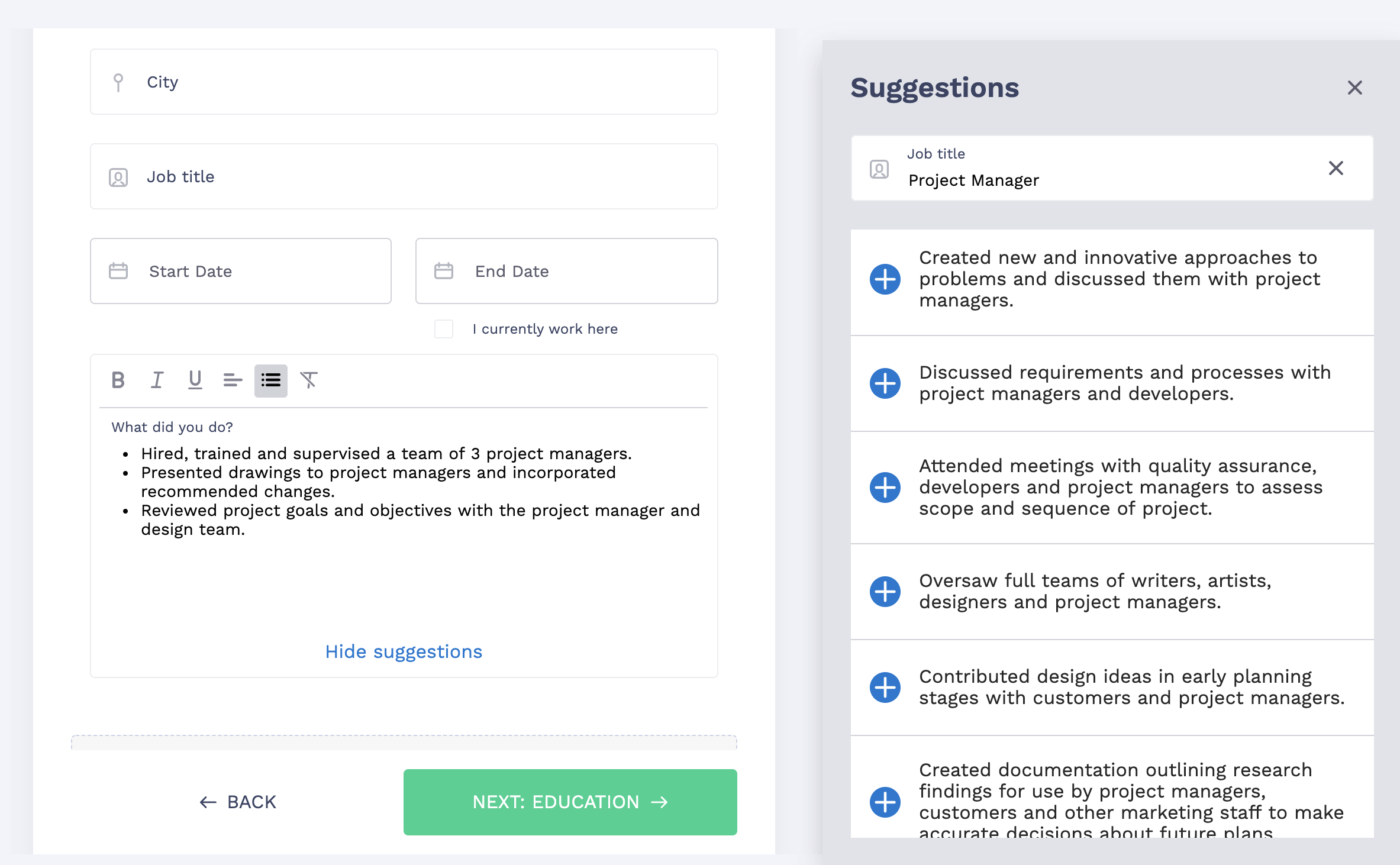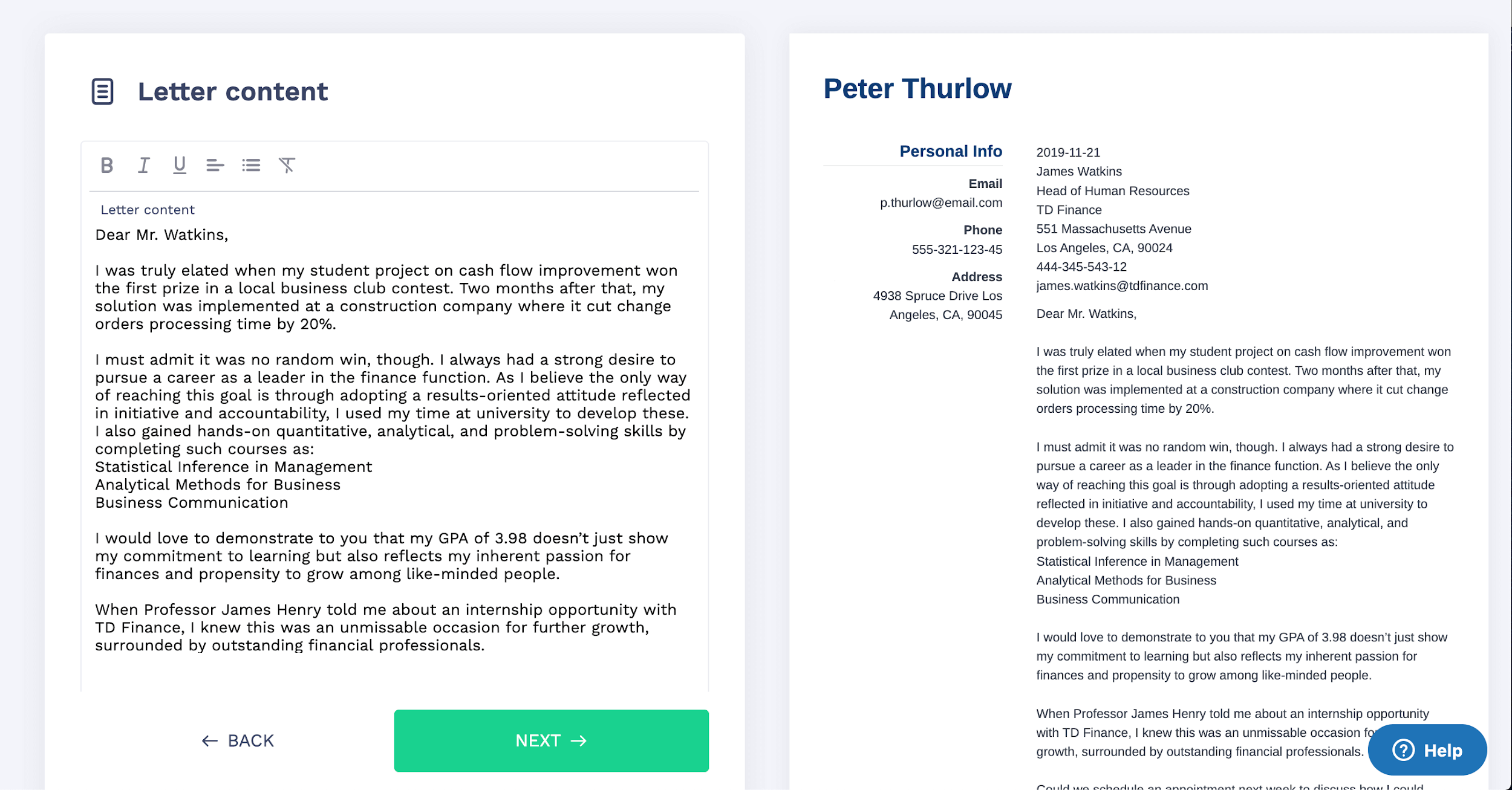
Skills You Need for Your Resume to Secure a Job
Wondering what good skills to put on your resume? Wonder no more! You’ll find a list of the right skills for your resume, regardless of your job or experience.

Olga Ber
Career Expert
Being a nurse is a challenging job. You’re at everyone’s beck and call and on constant standby. You must continuously hone the right skills to thrive in this profession and surround patients with solid care.
In case you wonder what superpowers should a nursing application include, we’ve created this extensive guide that covers a complete list of nursing resume skills. Read on to make sure you keep your hand in.
In this guide you’ll learn:
Save hours of work and get a job-winning resume like this. Try our resume builder with 20+ resume templates and create your resume now.

What users say about ResumeLab:
I had an interview yesterday and the first thing they said on the phone was: “Wow! I love your resume.”
Patrick
I love the variety of templates. Good job guys, keep up the good work!
Dylan
My previous resume was really weak and I used to spend hours adjusting it in Word. Now, I can introduce any changes within minutes. Absolutely wonderful!
George
You can look for nursing skills also in these guides:
Janet M. Rivas
Registered Nurse
252-695-2378
janetm@email.com
linkedin.com/in/janetmrivas
Summary
Licensed RN with 4+ years of clinical experience and highly-developed communication and problem-solving skills. Seeking to join Highlands Behavioral Health System-Littleton to provide attentive, patient-oriented nursing care that accelerates recovery. At Colorado Mental Health Institute, received a 95% score on care plan evaluation, assessed by a chief doctor.
Work Experience
Registered Nurse
Colorado Mental Health Institute, CO
March 2019–April 2023
Key Achievement:
Education
Bachelor of Science in Nursing
University of Colorado, CO
September 2015–June 2019
GPA: 3.95
Skills
Certificates
Languages
Interests
Could you imagine a policeman directing traffic, not knowing where’s his left and right? It’s the same with a disorganized nurse who gets to work on patients in distress. Nurses play a significant role in healthcare, providing diagnosis and contributing to healing. They must be highly organized, despite changing circumstances and a dynamic environment.
Nurses must possess soft and hard skills that enable them to perform their duties correctly. The soft skills of a nurse are individual abilities that are primarily necessary to communicate with patients. In turn, hard nursing skills are clinical competencies that qualify them to provide professional medical care and treatment. Both soft and hard nursing skills are equally important for the nursing role.
Although there’s quite a long list of nursing skills that you can list on your resume, employers specifically value a few of them.
Here’s a list of hard and soft skills for a nursing resume that you should consider:
From computer literacy to proficiency in technical device maintenance, nurses are expected to know how things work. Nurses need to possess technical skills as they use new technologies in cardiology, pulmonary, neurology, endocrinology, psychiatry, and more. Above all, nurses must be capable of monitoring vital signs, checking pulse and blood pressure, and listening for indications of labored breathing.
Patient assessment skills are the backbone of any medical competencies. They comprise examination and diagnosis and are the starting point for every care plan and treatment. To perform a successful patient assessment, a nurse must deeply understand body systems and remain attentive to details.
If it comes to urgent care and emergency, nurses are mostly on the frontline. Every nurse encounters situations that require immediate medical help, even if it’s not in an emergency room. The two key pieces of training: Basic Life Support and Cardiopulmonary Resuscitation are essential for every healthcare professional, nurses included.
Nurses must be able to assess wounds, prevent infection, and promote healing. They’re also expected to educate patients on proper wound care techniques, treatment, and prevention of further injury or infection.
Administering medications is one of the day-to-day nurses’ duties. It is to ensure that the right medication is handed in the appropriate dose and to the right person. But the list of medication responsibilities doesn’t start and end here. Prior to allocating medications, nurses check and validate the order as well as the condition of a patient. In turn, after assigning the right medication, they take care of the patient’s education and monitoring.
Documentation in nursing is essential to provide professional, safe, and effective patient care. It serves as a comprehensive record of a patient’s medical history, enables clear clinical communication, and provides legal protection. Reliable and precise documentation helps to develop individualized care plans and track their progress and effectiveness.
Organization is another significant skill a nurse should have. Thanks to successful time management skills, nurses can deal with their duties in the set time and deliver expected results. Since they’re obliged to handle paperwork, too, it is important that they split their time between formalities and pure action wisely.
Could you indicate any profession that doesn’t require decent communication skills and interpersonal skills? You probably can’t because barely any job is detached from communicating. Communication in nursing means exchanging vital information, thoughts, and feelings. It runs between a nurse and a patient but also within a team of medics.
People who get to the emergency room feel stressed out or, at best, uneasy. They seek professional help, but in the first place, they need empathy and compassion. A nurse’s role is to make them feel cared for and safe.
Nurses often face unexpected events, so they must possess critical thinking skills and a problem-solving approach. Thanks to them, they can act quickly and effectively in any emergency. Plus, thanks to good conflict resolution skills, they can overcome difficulties more easily and develop innovative ways to deal with challenging circumstances.
A nurse’s job is no walk in the park. It’s dynamic and unpredictable. Since nurses are regularly exposed to stressful situations, they must remain resilient and try to keep their emotions in check. A nurse is more likely to handle stressful, problematic situations with appropriate emotional management and a cool head.
Nurses need to reconcile two ways of working: independence and teamwork. On the one hand, they perform a list of duties that don’t require additional input or assistance. On the other thing, nurses rely on the help of other team members and doctors’ instructions. All in all, they can’t be over-independent and need to serve as a part of a collaborative team.
Being a professional as a nurse means adherence to standards and ethics, but also upholding confidentiality and responsible decision-making. Nurses are accountable for delivering safe and high-quality care while considering individual patient’s needs and circumstances.
When you think of nursing skills, you probably don’t consider leadership skills at first. However, they may apply to nurses who hold administrative and managerial positions. Strong leadership skills are vital to coordinate patient care, collaborate with different teams, and advocate for patients.
Expert Hint: Nurse leaders are mostly engaged in administrative and managerial tasks, but they have a solid clinical practice, too. Make sure that you highlight diverse nursing skills that make you a competent nurse.
Professional skills are one of the resume’s highlights. It’s where an employer lays his eye on, checking in if a candidate fits their expectations and requirements.
If you’re pondering what to include in your resume regarding skills and abilities, first, look at the job ad and identify the skills and abilities that are required from you. Now, see which of these skills you can mention as yours and incorporate them in various resume sections.
Your resume profile is a knowledge pill—your work experience, skills, and motivations are all rolled into one. This is where a recruiter starts the evaluation process, so make sure your resume profile follows the prescriptions.
Here’s how to draft your resume summary effectively:
Licensed RN with 4+ years of clinical experience and highly-developed communication and problem-solving skills. Seeking to join Highlands Behavioral Health System-Littleton to provide attentive, patient-oriented nursing care that accelerates recovery. At Colorado Mental Health Institute, received a 95% score on care plan evaluation, assessed by a chief doctor.
Your work experience section is where you boast of your professional achievements. But you wouldn’t deliver exceptional results without possessing relevant abilities and attributes. Ensure your accomplishments touch upon the skills that helped you flourish in a nurse role.
Take a look at these resume tips to write captivating job descriptions for your work experience section:
Registered Nurse
Colorado Mental Health Institute, CO
March 2019–April 2023
Key Achievement:
Whether you’re a Registered Nurse, Licensed Practical Nurse, or Licensed Vocational Nurse, your education and training matter. You must approach it as carefully as you approach every patient’s case. Plus, if you want to get the most out of the resume education section, enhance it with some extra activities you carried out throughout your schooling.
Here’s a great example:
Bachelor of Science in Nursing
University of Colorado, CO
September 2015–June 2019
GPA: 3.95
Now that you’ve mastered the above sections, it’s time to communicate your skills directly. But don’t just make your resume skills section a copy-paste list of abilities that you think would work. Make it tailored and substantial.
Here’s what to remember when creating a nursing resume skills list:
A recruitment process is an examination that aims to evaluate whether you’re suitable for the job you want. Don’t just stop at your nurse resume skills and let a recruiter study your resume extensively.
Employing extra resume sections makes your resume more comprehensive. Take advantage to expand on your abilities and explain how you developed them. These two examples show how:
Certificates
Expert Hint: Don’t make them wonder if you’re determined to get the job. Prepare a winning cover letter and improve the chances of your job-hunting success.
The ResumeLab builder is more than looks. Get specific content to boost your chances of getting the job. Add job descriptions, bullet points, and skills. Easy. Improve your resume in our resume builder now.

Nail it all with a splash of color, choose a clean font, and highlight your skills in just a few clicks. You're the perfect candidate, and we'll prove it. Use our resume builder now.
No one was ever born a specialist. Whether you’re a nursing student with an entry-level resume, a beginning nurse, or one with broad experience, there’s always room for growth in your career.
Here are some hints to enhance your nurse skills and strengthen your character:
There’s no universal list of things you can do to elevate your performance as a nurse. So, start with identifying your weak spots or areas you want to work on. Do you need more focus on your hard or soft nursing skills? Should you divide your attention among various areas or focus on just one?
Your education has led you to the point where getting a promising nursing job is within easy reach. But the story doesn’t end here. The nursing profession encounters dynamic changes, improvements, and developments. If you’re motivated to nurture your knowledge and expertise, look for chances to learn further. Check for nursing conferences, education courses, and other ways of gaining knowledge. There’s always something you can do to deepen your expertise.
Communication takes a lot of practice and effort. Nurses must be great listeners and be able to tune into patients’ needs. Smooth communication with therapeutic techniques betters relationships with patients and impacts their satisfaction. To cultivate your communication skills, look for valuable resources that you can draw from. Let it be workshops, books, podcasts, or any other means that feed your curiosity.
Technology has come into almost every area of our lives and still evolves. Improving your technology skills as a nurse is vital to keep up with the pace of scientific changes. Ensure you’re up-to-date with training and practice, and chase the latest industry novelties that impact your profession. Going further, you can run your research to look for innovations that may interest your executives and colleagues.
You might feel overwhelmed with the number of tasks on your list, but you must treat your patients with priority. With an overbearing amount of duties, it’s easy to forget about your biggest mission—serving people. Whenever you feel you’ve strayed, redirect your attention and focus on connecting with people. Think of how you can go beyond to make them feel better.
We’ve already emphasized patients’ well-being, but let’s not forget about your wellness, too. Don’t underestimate your physical and mental health, and treat yourself with the same care you have for your patients. If you feel overworked, you’re more exposed to mistakes and failures, which might have serious consequences. Just make sure you give your needs much priority, too.
Networking with other medics might be inspiring and uplifting. By this means, you can learn new things, deepen your knowledge, exchange experiences and open up to different points of view. Whenever you feel overwhelmed or burnt out, reaching out to other specialists in your field might refresh your perspective and help you take a different angle.
Double your impact with a matching resume and cover letter combo. Use our cover letter generator and make your application documents pop out.

Want to try a different look? There's 21 more. A single click will give your document a total makeover. Pick a cover letter template here.
Nursing skills are among the main recruiters’ interests when evaluating nurse resumes. Make sure you’ve selected the essential nursing skills to put on a resume and double-check if you integrated them into each section. To better understand how to showcase them in a resume, follow our examples. Lastly, hone your nursing skills to remain a competitive candidate.
Thanks for reading. If you need help incorporating nursing skills into your resume or have doubts about whether they will fit well, let us know in the comments. We’ll be happy to answer your questions.
ResumeLab is here to help you take your career to new heights, no matter what generation you are. Make use of our expert-approved resume templates, see resume examples for jobs in different career sectors, including jobs for Generation Z, get the perfect cover letter template, and everything you need to land your dream job.

Wondering what good skills to put on your resume? Wonder no more! You’ll find a list of the right skills for your resume, regardless of your job or experience.

Olga Ber
Career Expert

A targeted resume works because it’s personalized to the job description and the company. In this article, you’ll learn how to tailor your resume to get jobs.

Christian Eilers
Career Expert
![Medical Resume—Templates and 25+ Writing Tips [+Objective]](https://cdn-images.resumelab.com/pages/medical_listing.jpg)
You’re on the front-lines in the healthcare world, treating patients and improving quality of life. But employers won’t believe it without proof. Use this medical resume sample.

Tom Gerencer
Career Expert